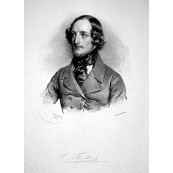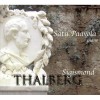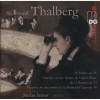| Country: | Austria, Italy |
| Period: | Romantique |
Biography
Sigismond Thalberg[1] (January 8, 1812 – April 27, 1871) was a composer and one of the most distinguished virtuoso pianists of the 19th century.
Sigismond Thalberg was born in Pâquis near Geneva, Switzerland, on January 8, 1812. According to his birth certificate, he was the son of "Joseph Thalberg" and "Fortunée Stein", both from Frankfurt-am-Main, but the names in the birth certificate are now regarded as fictitious.
The identity of Thalberg's mother is now generally accepted as Baroness Maria Julia Wetzlar von Plankenstern. She was born Julia Bydeskuty von Ipp, from a Hungarian family of a lower rank of the nobility. In 1820 she married Baron Alexander Ludwig Wetzlar von Plankenstern.[2]
Thalberg's father is believed to have been Prince Franz Joseph von Dietrichstein who also held the title 'von Thalberg'. Prince von Dietrichstein was unable to marry Thalberg's mother as he was already married (to Alexandrine Countess Schuwalow in 1797).
Little is known about Thalberg's childhood and early youth. It is possible that his mother had brought him to Vienna at the age of 10, (the same year in which the 10-year old Franz Liszt arrived there with his parents). According to Thalberg's own account, he attended the first performance of Beethoven's 9th Symphony on May 7, 1824, in the Kärntnerthortheater.[3]
There is no evidence as to Thalberg's early teachers. Baroness von Wetzlar, his mother, who according to Wurzbach was occupied with his education during his childhood and early youth, was a brilliant amateur pianist. It may be therefore that she gave him his first instruction at the piano.
In spring 1826 Thalberg studied with Ignaz Moscheles in London. Moscheles, according to a letter to Felix Mendelssohn of August 14, 1836, had the impression that Thalberg had already reached a level at which no further help would be needed in order to become a great artist.[4] Thalberg's first public performance in London was on May 17, 1826.[5] In Vienna on April 6, 1827 he played the first movement, and on May 6, 1827, the Adagio and the Rondo of Hummel's concerto in B Minor.[6] After this, Thalberg performed regularly in Vienna. His repertoire was mainly classical, including concertos by Hummel and Beethoven. He also performed chamber music. In the year 1828 his Op. 1, a fantasy on melodies from Carl Maria von Weber's Euryanthe, was published.
In 1830 Thalberg met Mendelssohn and Frédéric Chopin in Vienna. Their letters show their opinion that Thalberg's main strength was his astonishing technical skills.[7] Further information can be found in the diary of the 10-year old Clara Wieck. She had heard Thalberg on May 14, 1830, at a concert which he gave in the theatre of Leipzig. He had played his own Piano Concerto op.5 and a fantasy of his own. Two days before, Clara had played the first solo of the 2nd Concerto of John Field to him, and, together with him, the first movement of a four handed Sonata of Hummel. Her diary, edited by her father Friedrich Wieck, notes Thalberg as "very accomplished". His playing was clear and precise, also very strong and expressive.[8]
In the early 1830s Thalberg studied counterpoint under Simon Sechter. As a result, passages of canon and fugue can be found in some of Thalberg's fantasies of this time. An example is his Fantasy, Op. 12, on melodies from Bellini's opera Norma, which contains a march-theme and variations (one of them a canon), and a fugue on a lyrical theme. The fantasy was published in 1834 and became very popular; but on publication, it was criticised by some, for example by Robert Schumann.[9]
Thalberg successfully changed his composing style, reducing the counterpoint. Several works in his new style, among them the Deux Airs russes variés Op.17, were even enthusiastically praised by Schumann
In November 1835 Thalberg arrived in Paris. He performed on November 16, 1835, at a private concert of the Austrian ambassador Count Rudolph Apponyi. On January 24, 1836, he took part in a concert of the "Society of the Paris Conservatoire concerts", playing his "Grande fantaisie" op.22. Thalberg was praised by many of the most prominent artists, among them Rossini and Meyerbeer.
Chopin didn't share his fellow artists' enthusiasm. After hearing Thalberg play, in Vienna, Chopin wrote: "He plays splendidly, but he's not my man. He's younger than I and pleases the ladies - makes potpourris on La Muette - produces his piano and forte with the pedal, not the hand - takes tenths as I do octaves and wears diamond shirt studs".
His début at the Conservatoire concert was in the Revue et Gazette musicale of January 31, 1836, enthusiastically reviewed by Hector Berlioz.[11] The Ménestrel of March 13, 1836 wrote:
Moscheles, Kalkbrenner, Chopin, Liszt and Herz are and will always be for me great artists, but Thalberg is the creator of a new art which I do not know how to compare to anything that existed before him ... Thalberg is not only the premier pianist of the world, he is also an extremely distinguished composer.[12]
On April 16, 1836, Thalberg gave his first solo concert in Paris, and the success was again sensational. According to Rudolph Apponyi's diary, Thalberg made a profit of 10,000 Francs, a sum which no virtuoso had gained before from a single concert.[13]
Liszt had heard of Thalberg's successes during the winter 1835–36 in Geneva, in spring 1836 in Lyon, and in Paris. In his letter to Marie d'Agoult of April 29, 1836, he compared himself to the exiled Napoleon.[14] In a review of January 8, 1837, in the Revue et Gazette musicale, Liszt controversially denigrated Thalberg's compositions.[15]
After Thalberg returned to Paris in the beginning of February 1837, a rivalry developed between him and Liszt. On February 4, Thalberg heard Liszt play in concert for the first time in his life. Thalberg was stupefied. While Liszt then gave over a dozen concerts, Thalberg gave only one concert on March 12, 1837 in the Paris Conservatoire, and a further concert on April 2, 1837. In addition on March 31, 1837, both Liszt and Thalberg played at a benefit concert to raise money for Italian refugees.[16]
In May 1837 Thalberg gave a concert in London, following which The Athenaeum gave an enthusiastic review.[17] Such enthusiasm followed Thalberg throughout the following years. His fantasy op.33 on melodies from Rossini's opera Moïse became one of the most famous concert pieces of the 19th century, and was still praised by Berlioz in his Memoirs (1869). The fantasy was published at end of March 1839 and in May 1839 studied by Clara Wieck who was delighted by it.[18] In 1848 the fantasy was played by Liszt's daughter Blandine.
fter Thalberg's stay in London in May 1837, he made a first, short tour, giving concerts in several towns in Great Britain, but he became ill and soon returned to Vienna. In spring 1838 he gave concerts in Paris again. A note in the Revue et Gazette musicale of March 4, 1838,[20] shows that Thalberg's fame had in the meanwhile grown. He was now called "the most famous of our composers". Thalberg left Paris on April 18, 1838, travelling to Vienna, the very day that Liszt gave there a charity concert for the benefit of the victims of a flood in Hungary. Thalberg invited Liszt for dinner, and the two great pianists dined together on the 28th with Prince Moritz Dietrichstein, who told Liszt, that he was delighted to have "Castor and Pollux" together in his home. During the evening, Thalberg remarked to Liszt with admirable candour : " In comparison with you, I have never enjoyed more than a succes d'estime in Vienna". They dined again the next day, after Liszt's concert on April 29, 1838. Liszt and Thalberg were both dinner guests of Metternich[21] During Liszt's stay in Vienna Thalberg did not perform at all.[22]
In October 1838 Thalberg became acquainted with Robert Schumann. According to Schumann's diary, Thalberg played from memory etudes by Chopin, Joseph Christoph Kessler and Ferdinand Hiller. He also played with great skill and inspiration works by Beethoven, Schubert and Dussek, as well as Schumann's Kreisleriana, Op. 16 at sight.[23] On November 27, 1838, Thalberg took part in a charity concert, playing his new fantasy, Op. 40, on melodies from Rossini's opera La Donna del Lago ("The Lady of the Lake" after Walter Scott). At one of his own "Farewell concerts" on December 1, 1838, he played three of his Etudes, Op. 26, his fantasy, Op. 33 on "Moïse" and his Souvenir de Beethoven, Op. 39, a fantasy on melodies from Ludwig van Beethoven's symphonies.[24] As a result, in the Neue Zeitschrift für Musik of March 8, 1839,[25] an enthusiastic review by Schumann of the second book of Thalberg's Etudes, Op. 26 appeared, concluding "He is a God when sitting at the piano."
After Thalberg's "Farewell concert" in Vienna, he began his first extended European tour. On December 19 and December 21, 1838, he gave two concerts in Dresden, and he performed twice at the Court. Receiving honours from the King of Saxony, he told him "Wait until you have heard Liszt!"[26] In Leipzig he gave a concert on December 28, 1838, attended by Mendelssohn who on the following day, in a letter to his sister Fanny, gave an enthusiastic account.[27] Mendelssohn became a friend and admirer of Thalberg.
After a second concert in Leipzig on December 30, 1838, Thalberg travelled to Berlin, to give a series of concerts there. Via Danzig, Mitau and other places he performed at St. Petersburg, receiving excellent reviews. From St. Petersburg he went on a steamboat to London where he gave further concerts. He then journeyed to Brussels, to meet his friend the violinist Charles de Bériot. There he gave several private performances.
After Brussels, Thalberg arrived in the Rhineland, where he gave a series of concerts with Bériot. He returned to London at the beginning of February 1840, and then travelled from London to Paris together with Baroness Wetzlar, his mother, awaiting the arrival of Liszt.
Thalberg had already announced in December 1838, during his stay in Leipzig, that he would take time off at the end of his tour, and did not perform at any concert during his stay in spring 1840 in Paris.
At this time Mendelssohn, after meeting Liszt, compared him to Thalberg in a letter to his mother:
Thalberg, with his composure, and within his more restricted sphere, is more nearly perfect as a real virtuoso; and after all this is the standard by which Liszt must also be judged, for his compositions are inferior to his playing, and, in fact, are calculated solely for virtuosi.[28]
After the end of the Parisian concert season, Thalberg travelled as tourist in the Rhineland. In the beginning of June 1840 he attended a music festival directed by Louis Spohr in Aachen. He got an invitation from the Russian Tsarina and performed at a court-concert in Ems, but this was his only concert during his stay in the Rhineland. According to a note in the Revue et Gazette musicale of August 2, 1840, p. 410, Thalberg's friend, the violinist Charles Auguste de Bériot, would get married two days later in Elsene (Ixelles). His bride was a young lady Maria Huber, born in Vienna, from Germany. She was an orphan and had been adopted by Prince von Dietrichstein, Thalberg's father. It may therefore be presumed that Thalberg wanted to take part in the wedding celebration. During previous visits to the Rhineland he wanted only to relax. He also taught Bériot's son, the pianist Charles-Wilfrid de Bériot.
In the Revue et Gazette musicale of May 9, 1841,[29] an essay by Fétis appeared, 'Etudes d'exécution transcendente', in which Liszt was praised for a new composing style which had been stimulated by Thalberg's challenge. In letters to Fétis of May 17, 1841, and to Simon Löwy of May 20, 1841, Liszt agreed with this analysis.[
Thalberg performed in Brussels in fall 1840.[31] He then travelled to Frankfurt-am-Main where he stayed until January 1841. It had been announced that Thalberg would give concerts in Paris again in spring 1841, but he changed his plans. In Frankfurt he only took part in a charity concert on January 15, 1841, playing his fantasies on La Donna del Lago and Les Huguenots.[32] He was busily composing new works; his Second Don Giovanni Fantasy op.42 and the fantasy op.51 on Rossini's Semiramide date from this time.
In the second half of January 1841, Thalberg travelled from Frankfurt to Weimar, where he performed three times at the Grand Duke's court and also in the Theatre. He then went to Leipzig, where he visited Mendelssohn and Schumann. On February 8, 1841, he gave a solo concert in Leipzig, enthusiastically reviewed by Schumann,[33] playing his 'Second Don Giovanni Fantasy' op.42, his 'Andante final de Lucia di Lammermoor ', op.44, his 'Thême et Etude' op.45 and his Caprice op.46 on melodies from Bellini's La Sonnambula.
Clara Schumann noted in her diary:
On Monday Thalberg visited us and played to the delightment beautiful on my piano. An even more accomplished mechanism than his does not exist, and many of his piano effects must ravish the connoisseurs. He does not fail a single note, his passages can be compared to rows of pearls, his octaves are the most beautiful ones I ever heard.[34]
Mendelssohn's student Horsley wrote of the meeting of his teacher and Thalberg:
We were a trio, and after dinner Mendelssohn asked Thalberg if he had written anything new, whereupon Thalberg sat down to the piano and played his Fantasia from the "Sonnambula" ... At the close there are several runs of Chromatique Octaves, which at that time had not previously heard, and of which peculiar passages Thalberg was undoubtedly the inventor. Mendelssohn was much struck with the novel effect produced, and greatly admired its ingenuity ... he told me to be with him the next afternoon at 2 o'clock. When I arrived at his study door I heard him playing to himself, and practising continually this passage which had so struck him the previous day. I waited for at least half an hour listening in wonderment to the facility with which he applied his own thoughts to the cleverness of Thalberg's mechanism, and then went into the room. He laughed and said: 'Listen to this, is it not almost like Thalberg?'[35]
After his stay in Leipzig, Thalberg gave concerts in Breslau and Warsaw. He then travelled to Vienna and gave two successful concerts there. . In a review in the Leipziger Allgemeine musikalische Zeitung,[36] Thalberg was described as Liszt's only rival.
In winter 1841–1842, Thalberg gave concerts in Italy, while Liszt, from end of December 1841 until beginning of March 1842, gave a series of concerts in Berlin. Thalberg matched Liszt's successes in Berlin. He then returned via Marseilles, Toulon and Dijon, arriving on April 11, 1842, in Paris. On the next day he gave his first, and on April 21 his second concert. According to an account by Berlioz, Thalberg made a profit of 12,000 Francs from his first, and of 13,000 Francs from his second concert. The concerts were reviewed in the Revue et Gazette musicale by Henri Blanchard who two years before, in his review of Liszt's concert on April 20, 1840, had nominated Thalberg as Cesar, Octavian or Napoleon of the piano. In spring 1842, Blanchard reached for new superlatives even surpassing his former ones. In his review of Thalberg's second concert he wrote, Thalberg would in 100 years have been canonized, and by all coming pianists be invoked with name of Holy Thalberg. According to the account by Berlioz, at the end of Thalberg's second concert a golden crown was thrown to the stage.[37]
In addition to his own concerts, Thalberg took part in a concert of Emile Prudent. He then travelled via Brussels to London. Later in 1842 Thalberg was decorated with the Cross of the French Legion of Honour.[38] He travelled to Vienna where he stayed until fall 1842. In the second half of November until December 12, 1842, he made a further tour in Great Britain,[39] and in January 1843 he returned to Paris. At end of March 1843 he performed at a private concert of Pierre Erard, but this was his only concert appearance during that season.[40]
In March 1843 Heinrich Heine wrote about Thalberg:
His performance is so gentlemanly, so entirely without any forced acting the genius, so entirely without that well-known brashness that makes a poor cover for inner insecurity. Healthy women love him. So do sickly women, even though he does not engage their sympathy by epileptic seizures at the piano, even though he does not play at their overstrung, delicate nerves, even though he neither electrifies them nor galvanizes them.[41]
In winter 1843–44 Thalberg gave concerts in Italy again. At end of March 1844 he returned to Paris, where at the same time also Liszt was expected. Liszt arrived on April 8 and gave on April 16 a first concert, at which he played his Norma-fantasy, published shortly before. When composing his fantasy, Liszt had put many Thalberg-effects to it. In his later years, he told August Göllerich, one of his pupils:[42]
As I met Thalberg, I said to him: 'Here I have cribbed everything from you.' 'Yes,' he replied, 'there are Thalberg-passages included which are indeed indecent.'
Shortly after Liszt's concert on May 11, 1844, Thalberg left Paris. He travelled to London and gave on May 28, 1844, a concert there. At a further concert in London he played a concerto for three pianos by J. S. Bach together with Moscheles and Mendelssohn.[43] He also took part in a concert of Jules Benedict. In August 1844 he returned to Paris where he stayed until 1845. During the winter 1844–45 he gave a piano course for selected students at the Paris Conservatoire.[44] On April 2, 1845, he gave a concert in Paris, playing his fantasies op.63 on Rossini's Barber of Seville, op.67 on Donizetti's Don Pasquale and op.52 on Auber's La Muette de Portici, as well as his 'Marche funèbre variée' op.59 and the 'Barcarolle' op.60.
In spring 1848, in Vienna, Liszt met Thalberg once more. On May 3, 1848, Thalberg gave a benefit concert which Liszt attended. According to an account by his pupil Nepomuk Dunkl, Liszt was sitting on the stage, carefully listening and loudly applauding.[45] It was 11 years since he had first heard his rival's playing.
On July 22, 1843, Thalberg married Francesca ("Cecchina"), the eldest daughter of Luigi Lablache, first bass at the Théâtre des Italiens in Paris.[46] Thalberg went with his wife to Italy where they stayed for the winter 1843–44.
In 1855, after Thalberg's operas Florinda and Cristina di Svezia had failed, he realized his ambition to give concerts in America. From July to December 1855 he performed with overwhelming success in Rio de Janeiro and Buenos Aires. He returned to Europe, but after a stay of several months in Paris went on the steamboat Africa to North America, where he arrived on October 3, 1856, in New York. After Thalberg's debut there on November 10, 1856, a performance marathon ensued, during which he spent eight months giving concerts 5 or 6 days a week. Occasionally he gave two or even three concerts a day. On Sundays, concerts were generally only allowed if they presented "sacred music", but several times Thalberg performed anyhow, playing pieces like his Moïse-fantasy, based on a prayer from Rossini's opera, or his Huguenots-fantasy with the chorale "Ein feste Burg ist unser Gott" as main subject. His Andante op.32 and the Marche funèbre varié op.59 were also allowed.
Thalberg's first American season ended with a concert on July 29, 1857, in Saratoga Springs, NY. On September 15, 1857, he gave another concert in New York, starting his second season. With very few intermissions he was busy until his last concert on June 12, 1858, in Peoria, IL. By then he had visited nearly 80 cities and given more than 320 regular concerts in the United States and 20 concerts in Canada. In addition, he gave at least twenty free concerts for many thousands of schoolchildren. Thalberg also gave a series of solo matinees in New York and Boston at which he played own works as well as chamber music. From 1857, the violinist Henri Vieuxtemps toured with Thalberg. They played works by Beethoven, and Duos composed by Thalberg.
Thalberg's financial success on these tours was immense. He got an average of about $500 per concert and probably made more than $150,000 during his two seasons, the equivalent today of about $3 million.[47] A large part of his appeal on these tours was his unpretentious and unassuming personality; he did not resort to advertising gimmicks or cheap crowd-pleasing tricks, instead offering superbly polished renditions of his own compositions, which had already been well known in America. On rising from the piano, he was always the same quiet, respectable, self-possessed, middle-aged gentleman that he was at the dinner table of his hotel.[48] He played works by Beethoven, among them the sonatas op. 27 no. 2 ("Moonlight") and op.26 ("Funeral March") as well as the first movements of the Third and Fifth Piano Concertos. His cadenza to Beethoven's third concerto was admired. He also played works by Bach, Chopin, Hummel, Mendelssohn and several other composers.[49] The New-York Musical Review and Gazette of July 24, 1858, wrote:
Thalberg ... quite unexpectedly closed what has been a most brilliant career - completely successful, musically, giving to the talented and genial artist abundance of both fame and money. There is probably not another virtuoso, whether with instrument or voice (Liszt alone excepted), who could have excited a moiety of the enthusiasm, or gathered a fragment of the dollars, which Thalberg has excited and gathered.[50]
The "unexpected close" referred to the announcement in June 1858 in Chicago that Thalberg would make only one of three scheduled appearances before immediately returning to Europe. In fact, Thalberg did not even perform at that concert, but very hastily left. His wife had arrived from Europe, following reports that Thalberg had an extra-marital liaison.









